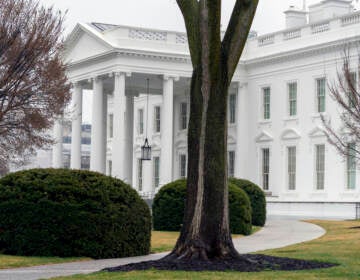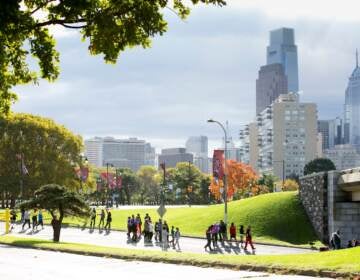On a sunny morning in Philly, thousands come ‘Out of the Darkness’ for suicide prevention
More than 6,000 people gathered in front of the Philadelphia Museum of Art on Sunday for the city's annual Out of the Darkness walk for suicide prevention.
Listen 0:00-

Participants of the annual Out of the Darkness Walk gather on the stair of the Philadelphia Museum of Art. The event is billed as a healing experience to help raise awareness around issues of suicide prevention. (Branden Eastwood for NewsWorks)
-

Members of team Dom pose for a photo before starting to walk in the annual Out of the Darkness Walk. The event is billed as a healing experience to help raise awareness around issues of suicide prevention. (Branden Eastwood for NewsWorks)
-
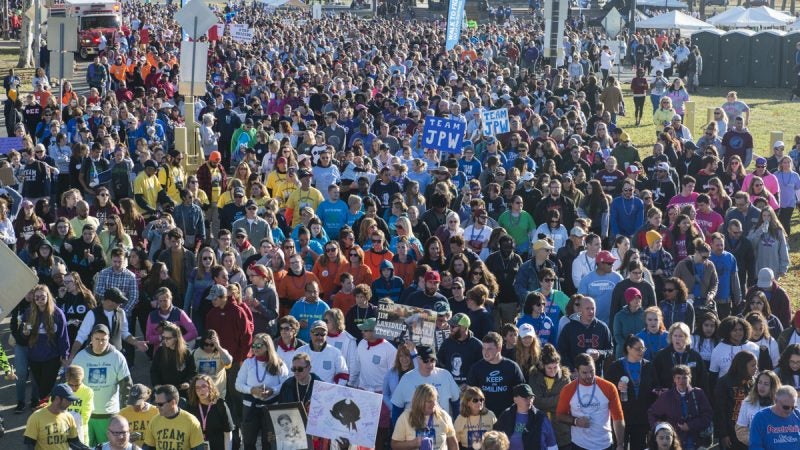
Participants in the Out of the Darkness Walk start to march away from the Philadelphia Museum of Art. The event is billed as a healing experience to help raise awareness around issues of suicide prevention. (Branden Eastwood for NewsWorks)
-
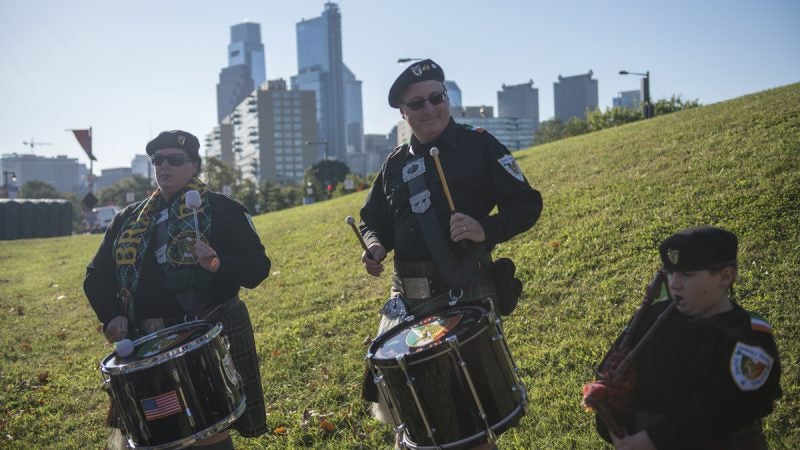
A group of bagpipers based out of King of Prussia play at the Out of the Darkness Walk. The event is billed as a healing experience to help raise awareness around issues of suicide prevention. (Branden Eastwood for NewsWorks)
-
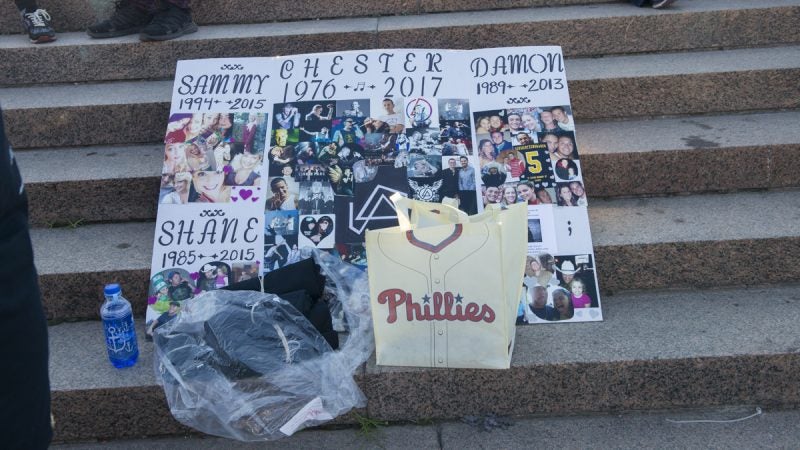
A memorial to individuals lost to suicide, including popular band Linkin Park’s lead singer Chester Bennington, sits at the Out of the Darkness Walk. (Branden Eastwood for NewsWorks)
-
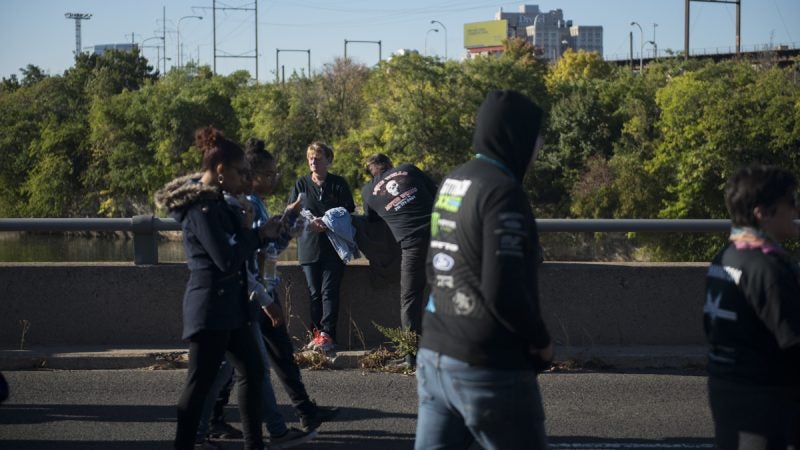
Linda and Mike Wells take a break from the annual Out of the Darkness Walk near the stairs of the Philadelphia Museum of Art. The Wells lost their son to suicide and attend the event every year. (Branden Eastwood for NewsWorks)
-

Corey Hinkle sits near the steps to the Philadelphia Museum of Art before the start of the Out of the Darkness Walk. Hinkle says that he lost his sister, aunt and cousin to suicide in a roughly four year period. (Branden Eastwood for NewsWorks)
-

Members of Project Semicolon, a group dedicated to issues of mental health, stand along the Schuykill River during the Out of the Darkness Walk. The event is billed as a healing experience to help raise awareness around issues of suicide prevention. (Branden Eastwood for WHYY)
Michelle Campbell’s son, Ryan had achieved his dream.
Despite an Asperger’s diagnosis that made life challenging at times, he was living independently in North Dakota pursuing his lifelong passions of hunting and fishing.
But less than a year after he moved to the Midwest, Campbell’s daughter noticed Ryan wasn’t posting on social media as he usually did.
“So I immediately called and we couldn’t get through,” Campbell said. “And then of course I had contacted the police and they went out and they had found Ryan in his apartment. He had died via gunshot wound to his head. We were devastated because he had been doing well. He was happy.”
That was in 2014. Since then, Campbell and her family have held fundraising events on behalf of the American Foundation for Suicide Prevention (AFSP). According to the foundation, more than 44,000 Americans die by suicide each year.
On Sunday, more than 6,000 people gathered in front of the Philadelphia Museum of Art for the city’s annual Out of the Darkness walk for suicide prevention. AFSP puts on hundreds of such walks in cities across the country every year.
Over the last two decades, families like the Campbells have helped to grow the foundation from a $700,000 non-profit to a $25 million organization that takes a multi-pronged approach to suicide prevention, said foundation CEO Bob Gebbia.
“We invest in research,” Gebbia said. “So we right now are spending about 13 million dollars in current research studies looking at everything from causes to new interventions, testing out things that would work to help prevent suicide.”
Such research, Gebbia said, has shown that identifying people with a history of depression or anxiety and targeting them for early intervention and treatment reduces the risk of suicide. But for that to happen, those people need healthcare. Gebbia is critical of Republican efforts to repeal the Affordable Care Act.
“We do not want to see people with mental health conditions be treated any differently than any other kind of health condition,” he said. “They need to get access to insurance, to get coverage so that they can get treatment.”
This year, the foundation is focusing on an effort to decrease the U.S. suicide rate by 20 percent by 2025. It’s a lofty goal to be sure, since rates have been slowly increasing for decades — up seven percent in the past seven years.
Andrew Butler came out to the walk in memory of his cousin, Matthew who committed suicide a few years ago after serving in the Marines in Iraq.
“And I think that was maybe part of the reason why [he comitted suicide],” Butler said. “He had some depression and some mental health issues. This country unfortunately doesn’t do enough for those that have issues, especially our veterans. So it’s something we need to work on quite a bit.”
Walking not far from Butler was Memy Lindeman, who lost her friend Mitch to suicide just a month ago.
“He was a quiet kid… He kept to himself a lot,” said Lindeman. “No one really thought anything as far as mental health issues, didn’t really know how bad they were, how much he was suffering. So I think it was just a shock to all of us.”
Nearby was Desiree Fernandez, who lost her mother about three years ago.
“She was a lovable person,” Fernandez said. “A beautiful mom. She was my partner in crime. We did everything together. She was always supportive to her family and I think she lost herself. She lost her sense of individuality and she couldn’t take the depression anymore.”
Sunday’s walk was expected to raise about $600,000 toward suicide prevention efforts.
WHYY is your source for fact-based, in-depth journalism and information. As a nonprofit organization, we rely on financial support from readers like you. Please give today.



